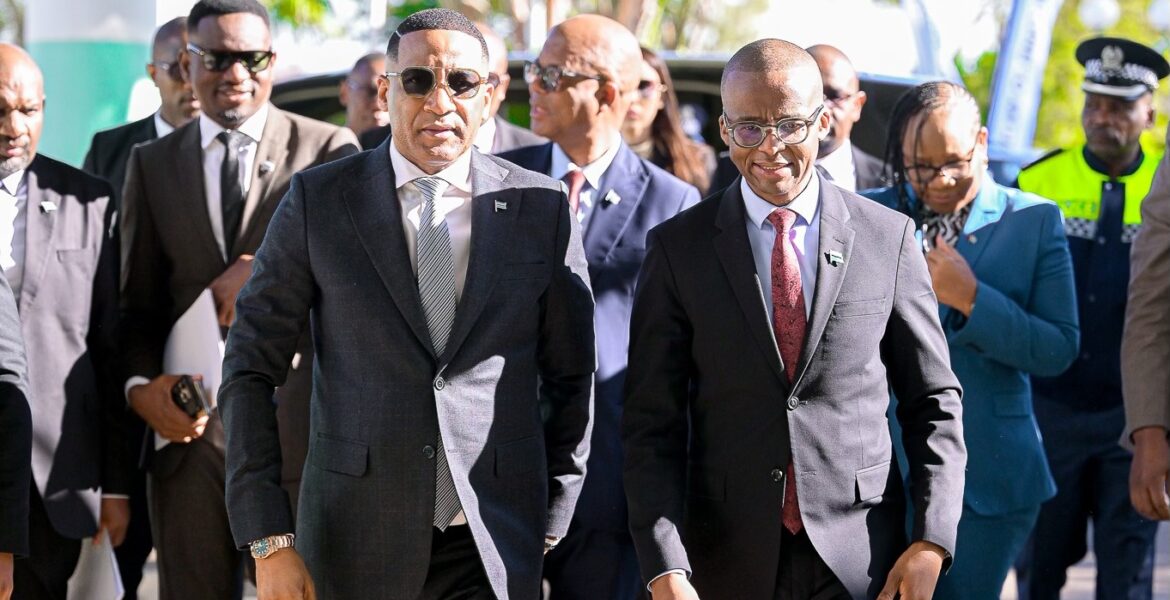Government offers priority mineral rights in bid to cut export duties
GAZETTE REPORTER
President Duma Boko’s administration has offered the United States priority access to critical minerals in ongoing negotiations to reduce export tariffs recently imposed on Botswana goods.
The United States government introduced a 37 percent tariff on all goods imported from Botswana, effective August 1, 2025. According to Diamond World, Botswana is the world’s second-largest diamond producer after Russia, with mineral exports to the US amounting to approximately $500 million annually. Before the tariff, Botswana’s diamond exports enjoyed zero-rated status in the US market.
President Boko sought to have the tariff delayed through direct engagement with Donald Trump’s administration, but these diplomatic efforts yielded no results. The tariff structure included a baseline 10 percent duty introduced in April 2025 and an additional 27 percent under new reciprocal measures, which Botswana regards as a serious threat to its export economy.
“These punitive measures threaten the sustainability of Botswana’s diamond industry and present a serious obstacle to broader economic growth across Africa,” President Boko said.
Strategic engagement with the US
In response, Botswana moved to offer concessions aimed at reducing the tariff. Weeks after its implementation, the government tabled a Strategic Bilateral Engagement proposal in July 2025, which offered the US first-mover rights in exploring three high-value geological zones. These zones are believed to contain multi-metal deposits, including critical minerals and rare earth elements.
A source familiar with the discussions confirmed that Vice President Ndaba Gaolathe met with US Secretary of Commerce Lutnik Howard on July 19, 2025. During the meeting, Howard assured that the United States Trade Representative (USTR) would share a framework outlining specific US trade concerns for Botswana’s consideration.
“While we wait for the framework detailing the specific trade concerns of the US, we submit the four proposals (using the initial discussions in the meeting of record as a basis) for consideration,” the Strategic Bilateral Engagement document noted.
Proposals to the United States
One of the central proposals involved granting the US government priority access to Botswana’s critical minerals. The structured exploration partnership would give American companies first-mover advantage across the identified zones. The offer also envisaged US participation in mining projects, with the US providing technical expertise.
Another element of the proposal involved facilitating US investment in other sectors, such as renewable energy, health, technology, and infrastructure. The government committed to supporting such investments through the Botswana One Stop Service Centre (BOSSC) by streamlining the process for acquiring permits, licences, and authorisations.
Botswana also committed to removing non-tariff barriers (NTBs) in international trade. The proposal indicated that the process of eliminating NTBs was already underway, but that Botswana would require US assistance, both technical and financial, to expedite completion. In addition, the government expressed willingness to receive and address specific US requests regarding NTBs and trade facilitation to enable the free movement of US imports into Botswana.
A final component of the proposals was Botswana’s readiness to consider and accept specific US product standards upon request. The document noted that the US has several standards development bodies that Botswana had already engaged with in the past.
Tariff Reduction Secured
Following the proposals, the US reduced the tariff on Botswana’s exports from 37 percent to 15 percent. The Ministry of Trade and Entrepreneurship announced the change on August 15, 2025, noting that the revised rate had taken effect on August 7.
“We wish to inform the business community and the general public that, effective August 7, 2025, the United States government has adjusted its Reciprocal Tariff Rates for its foreign trading partners, including Botswana,” Permanent Secretary Joel Ramaphoi said in a statement.
“Under the revised structure, the Reciprocal Tariff Rate applicable to Botswana’s exports to the United States has been reduced to 15 percent, down from the previous rate of 37 percent announced on April 2, 2025,” he added.
Ramaphoi explained that the tariff reduction was part of a series of US executive orders aimed at establishing a reciprocal trade framework with global partners. He noted that further adjustments could follow as negotiations progress.
“To further reduce or eliminate the 15 percent Reciprocal Tariff, Botswana and the US continue negotiations. These discussions aim to address the specific concerns of both parties and strengthen bilateral trade ties,” he said.
Concerns from Industry Stakeholders
While the government hailed the tariff reduction as a success, the concessions offered have drawn criticism from some quarters. Mining stakeholders have warned that granting priority access to mineral rights could contravene Botswana’s Mineral Rights Act and undermine communal land protections enshrined in the Tribal Land Act. They argue that mineral resources belong to Batswana, not to government negotiators.
Critics also caution that mining accounts for roughly 30 percent of Botswana’s GDP, and giving first-mover advantage to foreign firms risks diminishing local beneficiation opportunities, weakening DEBSWANA partnerships, and reviving exploitative resource models of the past.
There are also concerns about transparency. Stakeholders have pointed out that the negotiations took place without parliamentary debate or public consultation, raising questions about accountability in decisions involving the country’s most valuable resources.

